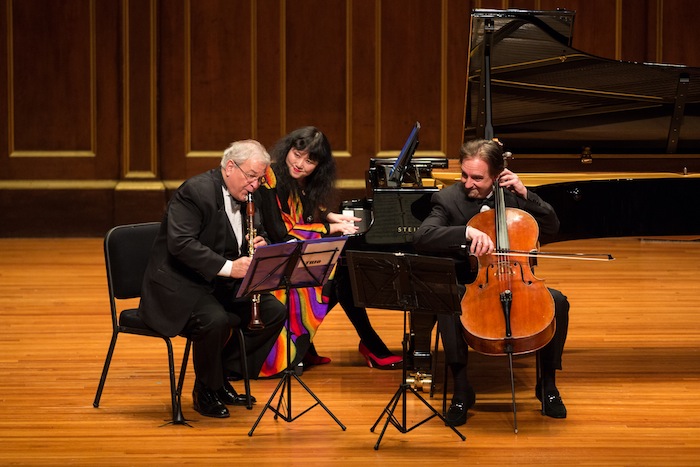Beethoven fares best in uneven night of clarinet trios

David Shifrin, Wu Han and David Finckel performed Friday night at Jordan Hall for the Celebrity Series. Photo: Robert Torres
Three chips off the old block of the Chamber Music Society of Lincoln Center—cellist David Finckel, pianist Wu Han, and clarinetist David Shifrin—gave rather frustrating performances of music by Beethoven, Bruch, and Brahms Friday night in New England Conservatory’s Jordan Hall.
One could hardly ask for players with more sterling chamber-music credentials: all three are current or former artistic directors of CMSLC, and Finckel was cellist of the top-drawer Emerson String Quartet for 34 years.
But one certainly could ask for more coherent and insightful playing than was heard at Friday’s concert, presented by Celebrity Series of Boston.
Virtuoso skill and precise ensemble were in evidence all evening, but not the kind of collective imagination that gives music life and a sense of where it’s going. This group seemed not to have gotten around to that yet, and the performance often had the air of a very proficient sight-reading session.
In these circumstances, Beethoven’s genial Clarinet Trio in B-flat major, Op. 11, fared the best of the three pieces on the program. The first movement’s attractive themes and deft sonata form carried the day, despite a tonal mismatch among the players, with Shifrin’s clarinet sounding exceptionally clear and round in all dynamics, Finckel’s cello somewhat dry and reedy, and Wu Han’s piano tone going out of focus at any dynamic less than forte. (The balance may have been affected by this listener’s location, close to the stage and looking up at the piano, not ideal for hearing that instrument.)
Early Beethoven works are notable for the lofty sentiments of their slow movements, and in Friday’s performance this trio’s Adagio was true to type and sensitively rendered. Shifrin in particular played everything, even the slightest accompaniment figure, with a sense of purpose.
The closing movement, variations on a popular opera tune by Joseph Weigl, showed the young Beethoven at his most freewheeling and imaginative, and the players did justice to the character of each variation, from mournful to ebullient and everything in between. One could wish they had also found the narrative thread that tied it all together, but this was a night to appreciate small pleasures.
Even these were few and far between in the four numbers selected from Max Bruch’s Eight Pieces, Op. 83, composed in 1910. Everybody loves a find, and this exotic combination of instruments needs a few, but on Friday it seemed that Bruch’s uninspired, late-to-the-party efforts to sound lush like Strauss, quirky like Schumann, and fleet like Mendelssohn may as well remain lost. Or at least they await a better argument for rescuing them.
Certainly better cases than this one have been made for Brahms’s dark, knotty Clarinet Trio, Op. 114, although the three players did project this composer’s craggy fury with gusto. To balance the loud parts, the performance needed more warmth and tenderness in the first movement’s major-key theme and in the Adagio second movement, and more sense of purpose and direction in general.
The dance-like third movement would have benefited from more lilt to its rhythm and more of the indicated “con moto.” In the finale, the players were once again effective in the loud passages, less so in the suspenseful ones in between.
In the encore, Brahms’s piano Intermezzo in E flat, Op. 117, No. 1, arranged by the pianist Stephen Hough, the three players seemed to relax into the piece’s lullaby mood and play with a fullness and warmth that would have been welcome earlier in the program.
The next presentation of Celebrity Series of Boston will be pianist Denis Kozhukhin, 8 p.m. Wednesday at Longy School’s Pickman Hall. celebrityseries.org; 617-482-6661.
Posted in Performances